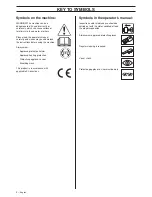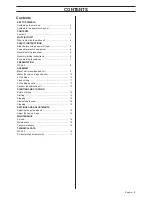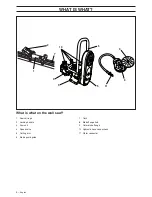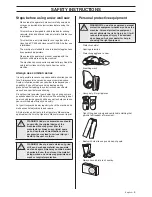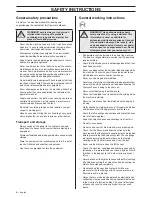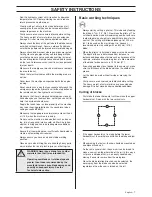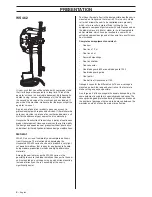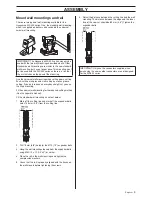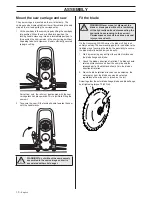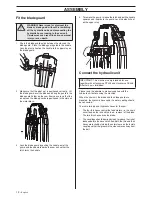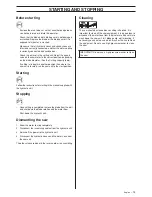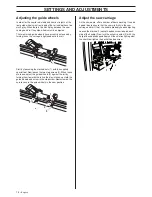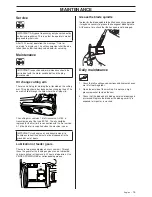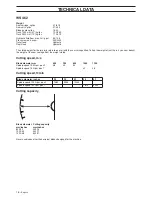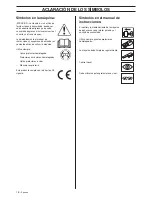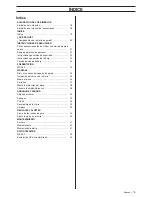
English
– 7
SAFETY INSTRUCTIONS
•
Run the hydraulic system until it reaches its operation
temperature of 30
°
C before starting to saw, to reduce
return pressure and other wear.
•
Clearly mark out all cuts to be made before you start
sawing, plan these so they can be carried out without
danger to persons or the machine.
•
Firmly secure or anchor concrete blocks before cutting.
The heavy weight of cut material can cause extensive
damage if it is not moved under controlled conditions.
•
Always check the back of the wall where the blade comes
out when cutting through. Secure, cordon off and make
sure that no people can be injured or materials damaged.
•
Always check and mark out where gas pipes are routed.
Cutting close to gas pipes always entails danger. Make
sure that sparks are not caused when cutting in view of
the risk of explosion. Remain concentrated and focused
on the task. Carelessness can result in serious personal
injury or death.
•
Make sure that no pipes or electrical cables are routed in
the area to be cut.
•
Check that electrical cables within the working area are
not live.
•
Never leave the machine unsupervised with the engine
running.
•
Never saw in such a way that you cannot easily reach the
emergency stop on the hydraulic unit orthe stop button on
the remote control. See hydraulic unit manual.
•
Make sure that there is always another person close at
hand when you use the machines, so that you can call for
help if an accident should occur.
•
People that need to be in close proximity of the machine
must wear hearing protection as the sound level when
cutting exceeds 85 dB(A).
•
Make sure that no people or animals come closer than 4
m (15 ft) when the machine is running.
•
Do not use the machine in bad weather, such as dense
fog, rain, strong wind, intense cold, etc. Working in bad
weather is tiring and can lead to dangerous conditions,
e.g. slippery surfaces.
•
Ensure that the working area is sufficiently illuminated to
create a safe working environment.
•
Always ensure you have a safe and stable working
position.
•
Observe care when lifting. You are handling heavy parts,
which implies the risk of pinch injuries or other injuries.
Basic working techniques
•
Always start by cutting a pilot cut. This is done by feeding
the blade 3-7 cm (1,2”-2,8”). Now make the pilot cut. The
cut should not be made at maximum speed, but with care
in order to obtain a straight cut and with that a basis for the
next cut. The cutting arm allows blades up to 1 000 mm
(40”) to be used as the start blade. It is, however,
recommended to start cutting with an 800 mm (31.5”)
blade.
•
When the pilot cut is finished, a deeper cut can be made.
The depth of these is determined from instance to
instance and depends on factors such as hardness of the
concrete, existence of reinforcing bar, etc. Max. diameter
of the blade for deeper cuts is 1,200 mm (47”).
•
If you change blades to cut deeper in the same cut, make
sure the thickness of the blade matches the width of the
groove.
•
Let the machine work without forcing or pressing the
blade.
•
Firmly secure or anchor concrete blocks before cutting.
The heavy weight of cut material can cause extensive
damage if it is not moved under controlled conditions.
Cutting of blocks
•
First make the lower horizontal cut. Now make the upper
horizontal cut. Finish with the two vertical cuts.
•
If the upper horizontal cut is made before the lower
horizontal cut, the work piece will fall on the blade and jam
it.
•
When making the last cut, the saw should be mounted on
an adjacent fixed wall.
•
As the rail is symmetrical, the saw unit can be turned to
make a new cut on the other side of the rail. In this way a
cut piece is obtained that is in an easily handled size,
making it easier to remove from the workplace.
•
Since the blade rotation direction can be selected, the
water spray from the blade can also be selected
regardless of how the saw is turned on the rail.
!
WARNING! Never use a blade for any other
materials than that it was intended for.
Operating saw blades at rotational speeds
greater than those recommended by the
manufacturer can cause blade damage and
possibly subsequent injury. See the
Technical data section.


